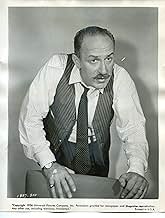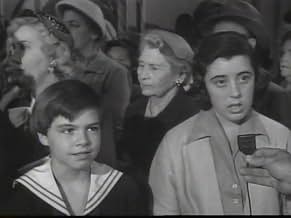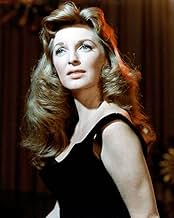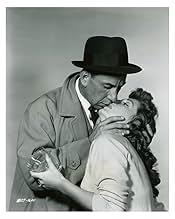Joe Harris, preparing a eulogy for popular radio commentator Herb Fuller, finds that nobody has a good word to say about him.Joe Harris, preparing a eulogy for popular radio commentator Herb Fuller, finds that nobody has a good word to say about him.Joe Harris, preparing a eulogy for popular radio commentator Herb Fuller, finds that nobody has a good word to say about him.
- Nominated for 1 BAFTA Award
- 3 nominations total
Edward Platt
- Dr. O'Connor
- (as Edward C. Platt)
Dorothy Abbott
- Stewardess
- (uncredited)
Walter Bacon
- Mourner
- (uncredited)
Featured reviews
When I was a kid in the 1960's, my father came back from Las Vegas smitten with a singer he had seen in one of the casino showrooms. Her name was Julie London.
I hadn't seen or heard of London again until I saw this film on TCM one night. I immediately agreed with my father. She, and the rest of the cast, were great in this movie.
Ed Wynn, who I also remember from my childhood as a comic fool on 1960's TV, turns in what in my opinion was an Oscar winning performance as the oddball manager of a religious radio station in a small town. His son, Keenan Wynn, turns in his usual loud, braying performance as an abrasive talent manager. And Jose Ferrer was impeccable as the man in the middle, who has to decide between honesty and cash.
I agree with another reviewer that the sound quality was terrible. I watched it with closed captioning, and the word "(unintelligible)" popped up more often than it should. But it doesn't distract from the context, which is fascinating. I highly recommend this forgotten gem.
I hadn't seen or heard of London again until I saw this film on TCM one night. I immediately agreed with my father. She, and the rest of the cast, were great in this movie.
Ed Wynn, who I also remember from my childhood as a comic fool on 1960's TV, turns in what in my opinion was an Oscar winning performance as the oddball manager of a religious radio station in a small town. His son, Keenan Wynn, turns in his usual loud, braying performance as an abrasive talent manager. And Jose Ferrer was impeccable as the man in the middle, who has to decide between honesty and cash.
I agree with another reviewer that the sound quality was terrible. I watched it with closed captioning, and the word "(unintelligible)" popped up more often than it should. But it doesn't distract from the context, which is fascinating. I highly recommend this forgotten gem.
This is a very interesting film for a variety of reasons. In many ways, it's a CITIZEN KANE knock-off, but sometimes in reverse. We see the reporter who is putting together the story of the great man, but we never see the great man himself. As in "Kane," the ex-wife is an alcoholic singer. There is also a "Rosebud" of sorts-a deathbed obscenity. Well worth watching!
Jose Ferrer should be better known as a director. Yes, it has some of the plot of Well's Kane, but it has more of the feel of a Jack Webb flick, he himself a greatly under rated director. Even Julie London, Webb's wife is in it.. Hard boiled hero, quirky supporting characters that are given a rounded humanity, and a great cast. See this film when it plays on Turner. And check out Webb's non Dragnet films; 30, the DI, Pete Kelly's Blues and The last time I saw Archie.
The immense influence Orson Welles' CITIZEN KANE (1941) has had on the language of cinema is well documented. So, to a lesser degree, is the freedom it gave film-makers – not always of comparable talent – towards (vaguely autobiographical) self-indulgence in their work. Yet another ripple it undeniably created (actually borrowed from THE POWER AND THE GLORY {1933}, which I own but have yet to watch!) led to a whole series of films taking a sour look at the American dream, depicting – via their flashback structure – the rise and fall of a successful but, at heart, unscrupulous public figure. Among these are RUTHLESS (1948), ALL ABOUT EVE (1950), THE BAD AND THE BEAUTIFUL (1952), Welles' own MR. ARKADIN aka CONFIDENTIAL REPORT (1955), THE Oscar (1966), etc.
THE GREAT MAN, then, is one such effort – and an unfairly neglected example into the bargain (even if both the Leslie Halliwell and Leonard Maltin movie guides are duly complimentary in their assessment) which rather suggests that it stands up better than other, more renowned titles in this vein! It also emerges as the most significant directorial venture by star/co-writer Ferrer. For the record, I own all 7 of the pictures he helmed – but, perhaps tellingly, this was only the second I have checked out (and which I opted to watch on the occasion of his birthday). Given the Oscar winner's reputation as a thespian, his choice of 'personal' projects was – for the most part – curiously bland and commercial in nature!
Setting this apart from the established formula is the fact that the subject of the expose' is never shown; we only learn about him – and, consequently, formulate our own opinion – from the way others (who knew him intimately, professionally or just vicariously through his popular radio show) react to news of his passing in a traffic accident. Besides, running concurrently with the main plot (the compiling of information by a small-time radio personality – played by Ferrer himself – for a "heart-rending" eulogy, to be delivered in a live broadcast by the network to commemorate "the great man") are the hero's conflicting emotions about his increasingly unpleasant and "phoney" task especially since he was being all but promoted as the deceased's successor on the airwaves!
Ultimately, the trump-cards here – which make all the difference – are the smartly cynical script (co-adapted by novel author Al Morgan) and a first-rate cast that, apart from Ferrer (in fine form), includes: real-life father and son Ed and Keenan Wynn (credited with, respectively, discovering and nurturing the ungrateful and opportunistic titular character); Julie London (as a chanteuse and his alcoholic mistress); and Dean Jagger (as the Machiavellian network head). Incidentally, the copy I viewed of this one was pretty substandard for the digital era (which has well and truly spoiled us movie-buffs, it must be said!) and, while a somewhat better-quality version does exist online, I had difficulty acquiring it...
THE GREAT MAN, then, is one such effort – and an unfairly neglected example into the bargain (even if both the Leslie Halliwell and Leonard Maltin movie guides are duly complimentary in their assessment) which rather suggests that it stands up better than other, more renowned titles in this vein! It also emerges as the most significant directorial venture by star/co-writer Ferrer. For the record, I own all 7 of the pictures he helmed – but, perhaps tellingly, this was only the second I have checked out (and which I opted to watch on the occasion of his birthday). Given the Oscar winner's reputation as a thespian, his choice of 'personal' projects was – for the most part – curiously bland and commercial in nature!
Setting this apart from the established formula is the fact that the subject of the expose' is never shown; we only learn about him – and, consequently, formulate our own opinion – from the way others (who knew him intimately, professionally or just vicariously through his popular radio show) react to news of his passing in a traffic accident. Besides, running concurrently with the main plot (the compiling of information by a small-time radio personality – played by Ferrer himself – for a "heart-rending" eulogy, to be delivered in a live broadcast by the network to commemorate "the great man") are the hero's conflicting emotions about his increasingly unpleasant and "phoney" task especially since he was being all but promoted as the deceased's successor on the airwaves!
Ultimately, the trump-cards here – which make all the difference – are the smartly cynical script (co-adapted by novel author Al Morgan) and a first-rate cast that, apart from Ferrer (in fine form), includes: real-life father and son Ed and Keenan Wynn (credited with, respectively, discovering and nurturing the ungrateful and opportunistic titular character); Julie London (as a chanteuse and his alcoholic mistress); and Dean Jagger (as the Machiavellian network head). Incidentally, the copy I viewed of this one was pretty substandard for the digital era (which has well and truly spoiled us movie-buffs, it must be said!) and, while a somewhat better-quality version does exist online, I had difficulty acquiring it...
A radio broadcaster and news commentator named Herb Fuller is injured and later dies in the hospital with word according to his doctor Edward Platt that aren't fit for broadcast. The radio network that he worked for has a vested interest in the personality of Fuller and what do they do. In The Man Who Shot Liberty Valance editor Carleton Young had the ready answer about when the legend becomes fact, print the legend.
Entertainment journalist Jose Ferrer is chosen to host a special radio tribute broadcast and it's put out through the grapevine that Ferrer could be the replacement for The Great Man. All Ferrer has to do is put together a show that fosters the legend of the late Mr. Fuller.
Easier said than done because all Ferrer comes up with in talking to those around him is what a no good rat this guy was. The man had not a sincere bone in his body, a two perfect two faced Janus with one face for the public and a completely different one for those who knew him.
Ferrer who directed this film as well as starred in it made sure that the supporting cast was a good one with some unforgettable roles. Ferrer the director was not interested in this being simply a star vehicle for the actor. He got some great performances out of people like Dean Jagger as the network president, Keenan Wynn as the manager of the late Mr. Fuller and Ferrer's manager, Julie London as Fuller's ex-wife, a drunken washed up nightclub singer and Ed Wynn as the eccentric radio station owner where Fuller got his start.
Keenan Wynn is especially interested. He's working on one grand agenda of his own. He's as cynical a human being as has ever been portrayed on the big screen, but in a really key scene with Ferrer he puts the final kibosh to the legend of Herb Fuller and shows he's got a really good reason for his cynicism. It's one of Keenan Wynn's best moments on the big screen.
The Great Man has been compared to Citizen Kane and rightly so. Unlike Kane where those who are digging for the facts are bland and faceless with the accent on the recollections by the survivors of Charles Foster Kane and the portrait they create of Kane in their flashbacks. Here we have no flashbacks, the accent is on how Ferrer deals with them giving them the real story on the legend and what he will do with it. The following year Elia Kazan in A Face In The Crowd took a different approach. We see the legend of Lonesome Rhodes built up by Andy Griffith and how it destructs in the end with Patricia Neal seeing it as a public duty.
Citizen Kane, A Face In The Crowd, and The Great Man and for that matter The Man Who Shot Liberty Valance are all really about the same topic, the difference between public personalities and the private lives behind them. The Great Man for some reason has been sadly neglected unlike the other three films. That is a pity because it is a film with great performances and some interesting things to say.
Entertainment journalist Jose Ferrer is chosen to host a special radio tribute broadcast and it's put out through the grapevine that Ferrer could be the replacement for The Great Man. All Ferrer has to do is put together a show that fosters the legend of the late Mr. Fuller.
Easier said than done because all Ferrer comes up with in talking to those around him is what a no good rat this guy was. The man had not a sincere bone in his body, a two perfect two faced Janus with one face for the public and a completely different one for those who knew him.
Ferrer who directed this film as well as starred in it made sure that the supporting cast was a good one with some unforgettable roles. Ferrer the director was not interested in this being simply a star vehicle for the actor. He got some great performances out of people like Dean Jagger as the network president, Keenan Wynn as the manager of the late Mr. Fuller and Ferrer's manager, Julie London as Fuller's ex-wife, a drunken washed up nightclub singer and Ed Wynn as the eccentric radio station owner where Fuller got his start.
Keenan Wynn is especially interested. He's working on one grand agenda of his own. He's as cynical a human being as has ever been portrayed on the big screen, but in a really key scene with Ferrer he puts the final kibosh to the legend of Herb Fuller and shows he's got a really good reason for his cynicism. It's one of Keenan Wynn's best moments on the big screen.
The Great Man has been compared to Citizen Kane and rightly so. Unlike Kane where those who are digging for the facts are bland and faceless with the accent on the recollections by the survivors of Charles Foster Kane and the portrait they create of Kane in their flashbacks. Here we have no flashbacks, the accent is on how Ferrer deals with them giving them the real story on the legend and what he will do with it. The following year Elia Kazan in A Face In The Crowd took a different approach. We see the legend of Lonesome Rhodes built up by Andy Griffith and how it destructs in the end with Patricia Neal seeing it as a public duty.
Citizen Kane, A Face In The Crowd, and The Great Man and for that matter The Man Who Shot Liberty Valance are all really about the same topic, the difference between public personalities and the private lives behind them. The Great Man for some reason has been sadly neglected unlike the other three films. That is a pity because it is a film with great performances and some interesting things to say.
Did you know
- TriviaLoosely based on the career of Arthur Godfrey.
- GoofsWhen Joe, Mike, and Jinny are listening to the "blood bank" tape, the VU meter has no relation to the audio.
- Quotes
Ginny: Feet of clay, huh?
Joe Harris: Right up to the knees, at least.
- Crazy creditsFerrer modestly omitted himself from the cast list at the end of the film.
- ConnectionsVersion of Pretendent (1987)
- SoundtracksThe Meaning of the Blues
Words and Music by Bobby Troup and Leah Worth
Performed by Julie London
[The song comes on the radio in Carol's apartment]
Details
- Release date
- Country of origin
- Language
- Also known as
- The Great Man
- Filming locations
- Universal Pictures Building, 445 Park Avenue, New York City, New York, USA(Amalgamated Broadcasting building)
- Production company
- See more company credits at IMDbPro
- Runtime
- 1h 32m(92 min)
- Color
Contribute to this page
Suggest an edit or add missing content






























